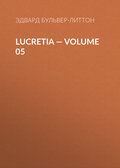
Эдвард Бульвер-Литтон
Pelham — Complete
CHAPTER XXIX
Here's a kind host, that makes the invitation,
To your own cost to his fort bon collation.
—Wycherly's Gent. Dancing Master.
Vous pouvez bien juger que je n'aurai pas grande peine a me
consoler d'une chose dont je me suis deja console tant de fois.
—Lettres de Boileau.
As I was walking home with Vincent from the Rue Mont-orgueil, I saw, on entering the Rue St. Honore, two figures before us; the tall and noble stature of the one I could not for a moment mistake. They stopped at the door of an hotel, which opened in that noiseless manner so peculiar to the Conciergerie of France. I was at the porte the moment they disappeared, but not before I had caught a glance of the dark locks and pale countenance of Warburton—my eye fell upon the number of the hotel.
“Surely,” said I, “I have been in that house before.”
“Likely enough,” growled Vincent, who was gloriously drunk. “It is a house of two-fold utility—you may play with cards, or coquet with women, selon votre gout.”
At these words I remembered the hotel and its inmates immediately. It belonged to an old nobleman, who, though on the brink of the grave, was still grasping at the good things on the margin. He lived with a pretty and clever woman, who bore the name and honours of his wife. They kept up two salons, one pour le petit souper, and the other pour le petit jeu. You saw much ecarte and more love-making, and lost your heart and your money with equal facility. In a word, the marquis and his jolie petite femme were a wise and prosperous couple, who made the best of their lives, and lived decently and honourably upon other people.
“Allons, Pelham,” cried Vincent, as I was still standing at the door in deliberation; “how much longer will you keep me to congeal in this ‘eager and nipping air’—‘Quamdiu nostram patientiam abutere Catilina.’”
“Let us enter,” said I. “I have the run of the house, and we may find—” “‘Some young vices—some fair iniquities’” interrupted Vincent, with a hiccup—
“‘Leade on good fellowe,’ quoth Robin Hood, Lead on, I do bid thee.’”
And with these words, the door opened in obedience to my rap, and we mounted to the marquis’s tenement au premiere.
The room was pretty full—the soi-disante marquise was flitting from table to table—betting at each, and coquetting with all; and the marquis himself, with a moist eye and a shaking hand, was affecting the Don Juan with the various Elviras and Annas with which his salon was crowded. Vincent was trying to follow me through the crowd, but his confused vision and unsteady footing led him from one entanglement to another, till he was quite unable to proceed. A tall, corpulent Frenchman, six foot by five, was leaning, (a great and weighty objection,) just before him, utterly occupied in the vicissitudes of an ecarte table, and unconscious of Vincent’s repeated efforts, first on one side, and then on the other, to pass him.
At last, the perplexed wit, getting more irascible as he grew more bewildered, suddenly seized the vast incumbrance by the arm, and said to him in a sharp, querulous tone, “Pray, Monsieur, why are you like the lote tree in Mahomet’s Seventh Heaven?”
“Sir!” cried the astonished Frenchman.
“Because,” (continued Vincent, answering his own enigma)—“because, beyond you there is no passing!”
The Frenchman (one of that race who always forgive any thing for a bon mot) smiled, bowed, and drew himself aside. Vincent steered by, and, joining me, hiccuped out, “In rebus adversis opponite pectora fortia.”
Meanwhile I had looked round the room for the objects of my pursuit: to my great surprise I could not perceive them; they may be in the other room, thought I, and to the other room I went; the supper was laid out, and an old bonne was quietly helping herself to some sweetmeat. All other human beings (if, indeed, an old woman can be called a human being) were, however, invisible, and I remained perfectly bewildered as to the non-appearance of Warburton and his companion. I entered the Salle a Jouer once more—I looked round in every corner—I examined every face—but in vain; and with a feeling of disappointment very disproportioned to my loss, I took Vincent’s arm, and we withdrew.
The next morning I spent with Madame D’Anville. A Frenchwoman easily consoles herself for the loss of a lover—she converts him into a friend, and thinks herself (nor is she much deceived) benefited by the exchange. We talked of our grief in maxims, and bade each other adieu in antitheses. Ah! it is a pleasant thing to drink with Alcidonis (in Marmontel’s Tale) of the rose-coloured phial—to sport with the fancy, not to brood over the passion of youth. There is a time when the heart, from very tenderness, runs over, and (so much do our virtues as well as vices flow from our passions) there is, perhaps, rather hope than anxiety for the future in that excess. Then, if Pleasure errs, it errs through heedlessness, not design; and Love, wandering over flowers, “proffers honey, but bears not a sting.” Ah! happy time! in the lines of one who can so well translate feeling into words—
“Fate has not darkened thee; Hope has not made The blossoms expand it but opens to fade; Nothing is known of those wearing fears Which will shadow the light of our after years.”—The Improvisatrice.
Pardon this digression—not much, it must be confessed, in my ordinary strain—but let me, dear reader, very seriously advise thee not to judge of me yet. When thou hast got to the end of my book, if thou dost condemn it or its hero—why “I will let thee alone (as honest Dogberry advises) till thou art sober; and, if thou make me not, then, the better answer, thou art not the man I took thee for.”
VOLUME III
CHAPTER XXX
It must be confessed, that flattery comes mighty
easily to one's mouth in the presence of royalty.
—Letters of Stephen Montague.
'Tis he.—How came he thence—what doth he here?
—Lara.
I had received for that evening (my last at Paris) an invitation from the Duchesse de B——. I knew that the party was to be small, and that very few besides the royal family would compose it. I had owed the honour of this invitation to my intimacy with the——s, the great friends of the duchesse, and I promised myself some pleasure in the engagement.
There were but eight or nine persons present when I entered the royal chamber. The most distingue of these I recognized immediately as the—. He came forward with much grace as I approached, and expressed his pleasure at seeing me.
“You were presented, I think, about a month ago,” added the—, with a smile of singular fascination; “I remember it well.”
I bowed low to this compliment.
“Do you propose staying long at Paris?” continued the—.
“I protracted,” I replied, “my departure solely for the honour this evening affords me. In so doing, please your—, I have followed the wise maxim of keeping the greatest pleasure to the last.”
The royal chevalier bowed to my answer with a smile still sweeter than before, and began a conversation with me which lasted for several minutes. I was much struck with the—‘s air and bearing. They possess great dignity, without any affectation of its assumption. He speaks peculiarly good English, and the compliment of addressing me in that language was therefore as judicious as delicate. His observations owed little to his rank; they would have struck you as appropriate, and the air which accompanied them pleased you as graceful, even in a simple individual. Judge, then, if they charmed me in the—. The upper part of his countenance is prominent and handsome, and his eyes have much softness of expression. His figure is slight and particularly well knit; perhaps he is altogether more adapted to strike in private than in public effect. Upon the whole, he is one of those very few persons of great rank whom you would have had pride in knowing as an equal, and have pleasure in acknowledging as a superior.
As the—paused, and turned with great courtesy to the Duc de—, I bowed my way to the Duchesse de B—. That personage, whose liveliness and piquancy of manner always make one wish for one’s own sake that her rank was less exalted, was speaking with great volubility to a tall, stupid looking man, one of the ministers, and smiled most graciously upon me as I drew near. She spoke to me of our national amusements. “You are not,” said she, “so fond of dancing as we are.”
“We have not the same exalted example to be at once our motive and our model,” said I, in allusion to the duchesse’s well known attachment to that accomplishment. The Duchesse D’A—came up as I said this, and the conversation flowed on evenly enough till the—‘s whist party was formed. His partner was Madame de la R—, the heroine of La Vendee. She was a tall and very stout woman, singularly lively and entertaining, and appeared to possess both the moral and the physical energy to accomplish feats still more noble than those she performed.
I soon saw that it would not do for me to stay very long. I had already made a favourable impression, and, in such cases, it is my constant rule immediately to retire. Stay, if it be whole hours, until you have pleased, but leave the moment after your success. A great genius should not linger too long either in the salon or the world. He must quit each with eclat. In obedience to this rule, I no sooner found that my court had been effectually made than I rose to withdraw.
“You will return soon to Paris,” said the Duchesse de B—.
“I cannot resist it,” I replied. “Mon corps reviendra pour chercher mon coeur.”
“We shall not forget you,” said the duchesse.
“Your Highness has now given me my only inducement not to return,” I answered, as I bowed out of the room.
It was much too early to go home; at that time I was too young and restless to sleep till long after midnight; and while I was deliberating in what manner to pass the hours, I suddenly recollected the hotel in the Rue St. Honore, to which Vincent and I had paid so unceremonious a visit the night before. Impressed with the hope that I might be more successful in meeting Warburton than I had then been, I ordered the coachman to drive to the abode of the old Marquis—The salon was as crowded as usual. I lost a few Napoleons at ecarte in order to pay my entree, and then commenced a desultory flirtation with one of the fair decoys. In this occupation my eye and my mind frequently wandered. I could not divest myself of the hope of once more seeing Warburton before my departure from Paris, and every reflection which confirmed my suspicions of his identity redoubled my interest in his connection with Tyrrell and the vulgar debauche of the Rue St. Dominique. I was making some languid reply to my Cynthia of the minute, when my ear was suddenly greeted by an English voice. I looked round, and saw Thornton in close conversation with a man whose back was turned to me, but whom I rightly conjectured to be Tyrrell.
“Oh! he’ll be here soon,” said the former, “and we’ll bleed him regularly to-night. It is very singular that you who play so much better should not have floored him yesterday evening.”
Tyrrell replied in a tone so low as to be inaudible, and a minute afterwards the door opened, and Warburton entered. He came up instantly to Thornton and his companion; and after a few words of ordinary salutation, Warburton said, in one of those modulated tones so peculiar to himself, “I am sure, Tyrrell, that you must be eager for your revenge. To lose to such a mere Tyro as myself, is quite enough to double the pain of defeat, and the desire of retaliation.”
I did not hear Tyrrell’s reply, but the trio presently moved towards the door, which till then I had not noticed, and which was probably the entrance to our hostess’s boudoir. The soi-disant marquise opened it herself, for which kind office Thornton gave her a leer and a wink, characteristic of his claims to gallantry. When the door was again closed upon them, I went up to the marquise, and after a few compliments, asked whether the room Messieurs les Anglois had entered, was equally open to all guests?
“Why,” said she, with a slight hesitation, “those gentlemen play for higher stakes than we usually do here, and one of them is apt to get irritated by the advice and expostulations of the lookers on; and so after they had played a short time in the salon last night, Monsieur Thornton, a very old friend of mine,” (here the lady looked down) “asked me permission to occupy the inner room; and as I knew him so well, I could have no scruple in obliging him.”
“Then, I suppose,” said I, “that, as a stranger, I have not permission to intrude upon them?”
“Shall I inquire?” answered the marquise.
“No!” said I, “it is not worth while;” and accordingly I re-seated myself, and appeared once more occupied in saying des belles choses to my kind-hearted neighbour. I could not, however, with all my dissimulation, sustain a conversation from which my present feelings were so estranged, for more than a few minutes; and I was never more glad than when my companion, displeased with my inattention, rose, and left me to my own reflections.
What could Warburton (if he were the person I suspected) gain by the disguise he had assumed? He was too rich to profit by any sums he could win from Tyrrell, and too much removed from Thornton’s station in life, to derive any pleasure or benefit from his acquaintance with that person. His dark threats of vengeance in the Jardin des Plantes, and his reference to the two hundred pounds Tyrrell possessed, gave me, indeed, some clue as to his real object; but then—why this disguise! Had he known Tyrrell before, in his proper semblance, and had anything passed between them, which rendered this concealment now expedient?—this, indeed, seemed probable enough; but, was Thornton entrusted with the secret?—and, if revenge was the object, was that low man a partaker in its execution?—or was he not, more probably, playing the traitor to both? As for Tyrrell himself, his own designs upon Warburton were sufficient to prevent pity for any fall into the pit he had dug for others.
Meanwhile, time passed on, the hour grew late, and the greater part of the guests were gone; still I could not tear myself away; I looked from time to time at the door, with an indescribable feeling of anxiety. I longed, yet dreaded, for it to open; I felt as if my own fate were in some degree implicated in what was then agitating within, and I could not resolve to depart, until I had formed some conclusions on the result.
At length the door opened; Tyrrell came forth—his countenance was perfectly hueless, his cheek was sunk and hollow, the excitement of two hours had been sufficient to render it so. I observed that his teeth were set, and his hand clenched, as they are when we idly seek, by the strained and extreme tension of the nerves, to sustain the fever and the agony of the mind. Warburton and Thornton followed him; the latter with his usual air of reckless indifference—his quick rolling eye glanced from the marquis to myself, and though his colour changed slightly, his nod of recognition was made with its wonted impudence and ease; but Warburton passed on, like Tyrrell, without noticing or heeding any thing around. He fixed his large bright eye upon the figure which preceded him, without once altering its direction, and the extreme beauty of his features, which, not all the dishevelled length of his hair and whiskers could disguise, was lighted up with a joyous but savage expression, which made me turn away, almost with a sensation of fear.
Just as Tyrrell was leaving the room, Warburton put his hand upon his shoulder—“Stay,” said he, “I am going your way, and will accompany you.” He turned round to Thornton (who was already talking with the marquis) as he said this, and waved his hand, as if to prevent his following; the next moment, Tyrrell and himself had left the room.
I could not now remain longer. I felt a feverish restlessness, which impelled me onwards. I quitted the salon, and was on the escalier before the gamesters had descended. Warburton was, indeed, but a few steps before me; the stairs were but very dimly lighted by one expiring lamp; he did not turn round to see me, and was probably too much engrossed to hear me.
“You may yet have a favourable reverse,” said he to Tyrrell.
“Impossible!” replied the latter, in a tone of such deep anguish, that it thrilled me to the very heart. “I am an utter beggar—I have nothing in the world—I have no expectation but to starve!”
While he was saying this, I perceived by the faint and uncertain light, that Warburton’s hand was raised to his own countenance.
“Have you no hope—no spot wherein to look for comfort—is beggary your absolute and only possible resource from famine?” he replied, in a low and suppressed tone.
At that moment we were just descending into the court-yard. Warburton was but one step behind Tyrrell: the latter made no answer; but as he passed from the dark staircase into the clear moonlight of the court, I caught a glimpse of the big tears which rolled heavily and silently down his cheeks. Warburton laid his hand upon him.
“Turn,” he cried, suddenly, “your cup is not yet full—look upon me—and remember!”
I pressed forward—the light shone full upon the countenance of the speaker—the dark hair was gone—my suspicions were true—I discovered at one glance the bright locks and lofty brow of Reginald Glanville. Slowly Tyrrell gazed, as if he were endeavouring to repel some terrible remembrance, which gathered, with every instant, more fearfully upon him; until, as the stern countenance of Glanville grew darker and darker in its mingled scorn and defiance, he uttered one low cry, and sank senseless upon the earth.
CHAPTER XXXI
Well, he is gone, and with him go these thoughts.
—Shakspeare.
What ho! for England!
—Shakspeare.
I have always had an insuperable horror of being placed in what the vulgar call a predicament. In a predicament I was most certainly placed at the present moment. A man at my feet in a fit—the cause of it having very wisely disappeared, devolving upon me the charge of watching, recovering, and conducting home the afflicted person—made a concatenation of disagreeable circumstances, as much unsuited to the temper of Henry Pelham, as his evil fortune could possibly have contrived.
After a short pause of deliberation, I knocked up the porter, procured some cold water, and bathed Tyrrell’s temples for several moments before he recovered. He opened his eyes slowly, and looked carefully round with a fearful and suspicious glance: “Gone—gone—(he muttered)—ay—what did he here at such a moment?—vengeance—for what?—I could not tell—it would have killed her—let him thank his own folly. I do not fear; I defy his malice.” And with these words, Tyrrell sprung to his feet.
“Can I assist you to your home?” said I; “you are still unwell—pray suffer me to have that pleasure.”
I spoke with some degree of warmth and sincerity; the unfortunate man stared wildly at me for a moment, before he replied. “Who,” said he, at last, “who speaks to me—the lost—the guilty—the ruined, in the accents of interest and kindness?”
I placed his arm in mine, and drew him out of the yard into the open street. He looked at me with an eager and wistful survey, and then, by degrees, appearing to recover his full consciousness of the present, and recollection of the past, he pressed my hand warmly, and after a short silence, during which we moved on slowly towards the Tuileries, he said,—“Pardon me, Sir, if I have not sufficiently thanked you for your kindness and attention. I am now quite restored; the close room in which I have been sitting for so many hours, and the feverish excitement of play, acting upon a frame very debilitated by ill health, occasioned my momentary indisposition. I am now, I repeat, quite recovered, and will no longer trespass upon your good nature.”
“Really,” said I, “you had better not discard my services yet. Do suffer me to accompany you home?”
“Home!” muttered Tyrrell, with a deep sigh; “no—no!” and then, as if recollecting himself, he said, “I thank you, Sir, but—but—” I saw his embarrassment, and interrupted him.
“Well, if I cannot assist you any further, I will take your dismissal. I trust we shall meet again under auspices better calculated for improving acquaintance.”
Tyrrell bowed, once more pressed my hand, and we parted. I hurried on up the long street towards my hotel.
When I had got several paces beyond Tyrrell, I turned back to look at him. He was standing in the same place in which I had left him. I saw by the moonlight that this face and hands were raised towards Heaven. It was but for a moment: his attitude changed while I was yet looking, and he slowly and calmly continued his way in the same direction as myself. When I reached my chambers, I hastened immediately to bed, but not to sleep: the extraordinary scene I had witnessed; the dark and ferocious expression of Glanville’s countenance, so strongly impressed with every withering and deadly passion; the fearful and unaccountable remembrance that had seemed to gather over the livid and varying face of the gamester; the mystery of Glanville’s disguise; the intensity of a revenge so terribly expressed, together with the restless and burning anxiety I felt—not from idle curiosity, but, from my early and intimate friendship for Glanville, to fathom its cause—all crowded upon my mind with a feverish confusion, that effectually banished repose.
It was with that singular sensation of pleasure which none but those who have passed frequent nights in restless and painful agitation, can recognize, that I saw the bright sun penetrate through my shutters, and heard Bedos move across my room.
“What hour will Monsieur have the post horses?” said that praiseworthy valet.
“At eleven,” answered I, springing out of bed with joy at the change of scene which the very mention of my journey brought before my mind.
I was a luxurious personage in those days. I had had a bath made from my own design; across it were constructed two small frames—one for the journal of the day, and another to hold my breakfast apparatus; in this manner I was accustomed to lie for about an hour, engaging the triple happiness of reading, feeding, and bathing. Owing to some unaccountable delay, Galignani’s Messenger did not arrive at the usual hour, on the morning of my departure; to finish breakfast, or bathing, without Galignani’s Messenger, was perfectly impossible, so I remained, till I was half boiled, in a state of the most indolent imbecility.
At last it came: the first paragraph that struck my eyes was the following:—“It is rumoured among the circles of the Faubourg, that a duel was fought on—, between a young Englishman and Monsieur D—; the cause of it is said to be the pretensions of both to the beautiful Duchesse de P—, who, if report be true, cares for neither of the gallants, but lavishes her favours upon a certain attache to the English embassy.”
“Such,” thought I, “are the materials for all human histories. Every one who reads, will eagerly swallow this account as true: if an author were writing the memoirs of the court, he would compile his facts and scandal from this very collection of records; and yet, though so near the truth, how totally false it is! Thank Heaven, however, that, at least, I am not suspected of the degradation of the duchesse’s love:—to fight for her may make me seem a fool—to be loved by her would constitute me a villain.”
The next passage in that collection of scandal which struck me was—“We understand that E. W. Howard de Howard, Esq., Secretary, is shortly to lead to the hymeneal altar the daughter of Timothy Tomkins, Esq., late Consul of—.” I quite started out of my bath with delight. I scarcely suffered myself to be dried and perfumed, before I sat down to write the following congratulatory epistle to the thin man:—
“My dear Mr. Howard de Howard,
“Permit me, before I leave Paris, to compliment you upon that happiness which I have just learnt is in store for you. Marriage to a man like you, who has survived the vanities of the world—who has attained that prudent age when the passions are calmed into reason, and the purer refinements of friendship succeed to the turbulent delirium of the senses—marriage, my dear Mr. Howard, to a man like you, must, indeed, be a most delicious Utopia. After all the mortifications you may meet elsewhere, whether from malicious females, or a misjudging world, what happiness to turn to one being to whom your praise is an honour, and your indignation of consequence!
“But if marriage itself be so desirable, what words shall I use sufficiently expressive of my congratulation at the particular match you have chosen, so suitable in birth and station? I can fancy you, my dear Sir, in your dignified retirement, expatiating to your admiring bride upon all the honours of your illustrious line, and receiving from her, in return, a full detail of all the civic glories that have ever graced the lineage of the Tomkins’s. As the young lady is, I suppose, an heiress, I conclude you will take her name, instead of changing it. Mr. Howard de Howard de Tomkins, will sound peculiarly majestic; and when you come to the titles and possessions of your ancestors, I am persuaded that you will continue to consider your alliance with the honest citizens of London among your proudest distinctions.
“Should you have any commands in England, a letter directed to me in Grosvenor-square will be sure to find me; and you may rely upon my immediately spreading among our mutual acquaintance in London, the happy measure you are about to adopt, and my opinions on its propriety.
“Adieu, my dear Sir,
“With the greatest respect and truth,
“Yours,
“H. Pelham.”
“There,” said I, as I sealed my letter, “I have discharged some part of that debt I owe to Mr. Howard de Howard, for an enmity towards me, which he has never affected to conceal. He prides himself on his youth—my allusions to his age will delight him! On the importance of his good or evil opinion—I have flattered him to a wonder! Of a surety, Henry Pelham, I could not have supposed you were such an adept in the art of panegyric.”
“The horses, Sir!” said Bedos; and “the bill, Sir?” said the garcon. Alas! that those and that should be so coupled together; and that we can never take our departure without such awful witnesses of our sojourn. Well—to be brief—the bill for once was discharged—the horses snorted—the carriage door was opened—I entered—Bedos mounted behind—crack went the whips—off went the steeds, and so terminated my adventures at dear Paris.







